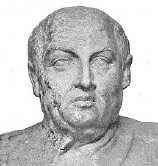Stoics and Epicureans
According to the Stoics, the universe was controlled in every detail by God (Zeus), who ordered everything for ultimate good. Humans alone of all creatures were enabled by their reason to perceive this Divine Order; reason is therefore regarded as humanity's special link with the mind of God.
Despite their deterministic* theories, the Stoic ethic in practice was mainly a struggle to overcome passion* --the great enemy of reason, and hindrance to virtue.
Epicurus taught that "nature . . . runs the universe without the aid of gods" (Lucretius 92). Consequently, humans have free will and the sole responsibility for their actions*; fear of the supernatural is merely a superstition* that diminishes one's free enjoyment of life.
Epicureans, like Stoics, believed that the end of human action is to be free from pain and fear. The hedonist doctrine that "pleasure is our first and native good" did not advocate gluttony or unbounded self-indulgence*; rather, it advocated the pleasure of a tranquil mind and body.
Footnotes
-
Determinism
Caesar: What can be avoided
Whose end is purposed by the mighty gods?
(Julius Caesar 2.2.26-27) -
Passion
In particular, Stoics fought the emotions of pleasure, desire, fear, and melancholy (sorrow or depression). Thus it is ironical that Brutus first tells Cassius of Portia's death, in extenuating his unkind bitterness in the quarrel, then appears to feign stoic indifference when Titinius brings the news again. (Though this flaw in Brutus' character has so disturbed some critics that they argue that the scene was revised by Shakespeare, two versions of the scene being confused.)
-
Responsibility
Hence Cassius' famous line:
The fault, dear Brutus, is not in our stars,
But in ourselves that we are underlings
(Julius Caesar, 1.2.140-41) -
Superstition
In Julius Caesar, Casca is horrified that Cassius is unafraid of grim natural portents:
"But wherefore did you so much tempt the heavens?
It is the part of men to fear and tremble
When the most mighty gods by tokens send
Such dreadful heralds to astonish us."
(1.3.53-56)
Thus it is ironical that towards the end of the play, Cassius begins to waver in his beliefs:
You know that I held Epicurus strong,
And his opinion; now I change my mind,
And partly credit things that presage.
(5.1.76-78) -
Self-indulgence?
However, in Shakespeare (as in modern usage), Epicureanism is often synonymous for extreme indulgence of appetites. Pompey expects Antony "the libertine" to be still detained in Egypt by Cleopatra and other unrivalled pleasures:
"Epicurean cooks
Sharpen with cloyless sauce his appetite,
That sleep and feeding may prorogue his honor
Even till a Lethe'd dullness."
(Antony and Cleopatra 2.1.24-27)
In King Lear, Goneril complains about the riotous behaviour of Lear's retainers in her castle:
"Epicurism and lust
Makes it more like a tavern or a brothel
Than a graced palace."
(1.4.245-47)
